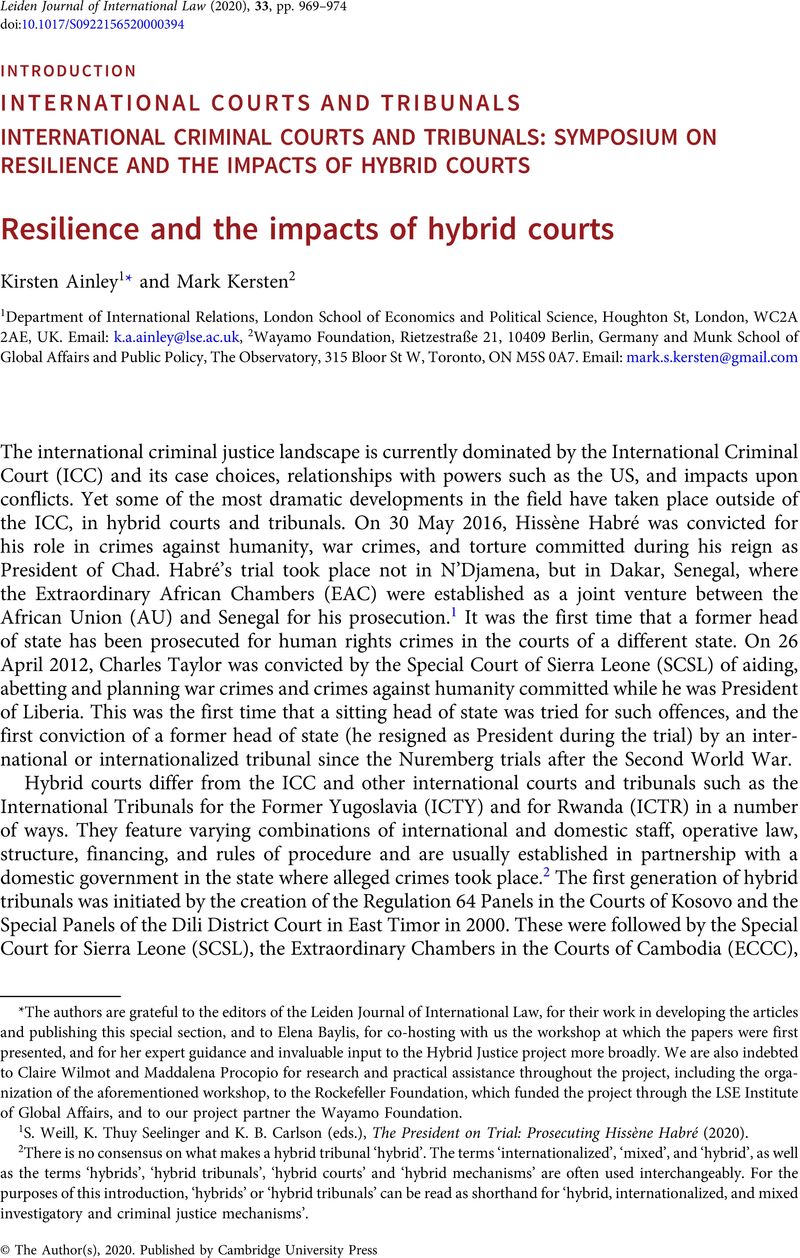Published online by Cambridge University Press: 04 September 2020

The authors are grateful to the editors of the Leiden Journal of International Law, for their work in developing the articles and publishing this special section, and to Elena Baylis, for co-hosting with us the workshop at which the papers were first presented, and for her expert guidance and invaluable input to the Hybrid Justice project more broadly. We are also indebted to Claire Wilmot and Maddalena Procopio for research and practical assistance throughout the project, including the organization of the aforementioned workshop, to the Rockefeller Foundation, which funded the project through the LSE Institute of Global Affairs, and to our project partner the Wayamo Foundation.
1 Weill, S., Thuy Seelinger, K. and Carlson, K. B. (eds.), The President on Trial: Prosecuting Hissène Habré (2020)CrossRefGoogle Scholar.
2 There is no consensus on what makes a hybrid tribunal ‘hybrid’. The terms ‘internationalized’, ‘mixed’, and ‘hybrid’, as well as the terms ‘hybrids’, ‘hybrid tribunals’, ‘hybrid courts’ and ‘hybrid mechanisms’ are often used interchangeably. For the purposes of this introduction, ‘hybrids’ or ‘hybrid tribunals’ can be read as shorthand for ‘hybrid, internationalized, and mixed investigatory and criminal justice mechanisms’.
3 M. Kersten, ‘As the Pendulum Swings – The Revival of the Hybrid Tribunal’, in M. J. Christensen and R. Levi (eds.), International Practices of Criminal Justice (2017), 251–73; B. Van Schaack, ‘The Building Blocks of Hybrid Justice’, (2016) Denver Journal of International Law and Policy 44, at 169.
4 D. Guilfoyle, ‘Part I- This is not fine: The International Criminal Court in Trouble’, EJIL:Talk!, 21 March 2019, available at www.ejiltalk.org/part-i-this-is-not-fine-the-international-criminal-court-in-trouble/; M. Kersten and A. Mudukuti, ‘Building bridges and reaching compromise: Constructive engagement in the Africa-ICC relationship’, (2018) Wayamo Policy Paper, available at www.wayamo.com/archives/policy-paper-africa-and-the-icc-building-bridges-and-reaching-compromise/; K. Ainley, ‘The International Criminal Court on Trial’, (2011) 24(3) Cambridge Review of International Affairs 309–33; K. Ainley, ‘State Power, Head of State Immunity and the Crisis at the International Criminal Court’, in A. Brysk and M. Stohl (eds.), Contracting Human Rights: Crisis, Accountability, and Opportunity (2018), 179–93.
5 Details of the project can be found at hybridjustice.com. The website contains extensive further resources on hybrid tribunals.
6 The Dakar Guidelines on the Establishment of Hybrid Courts are available at hybridjustice.files.wordpress.com/2019/08/dakar-guidelines_digital-version.pdf.
7 S. Buckley-Zistel et al. (eds.), Transitional Justice Theories (2014); DfID, ‘UK aid: tackling global challenges in the national interest’, 2015, available at www.gov.uk/government/uploads/system/uploads/attachment_data/file/478834/ODA_strategy_final_web_0905.pdf; E. Skaar, C. G. Malca and T. Eide, After Violence: Transitional Justice, Peace, and Democracy (2015); UNSG, ‘Guidance Note of the Secretary-General on the United Nations Approach to Transitional Justice’, 2010, available at www.un.org/ruleoflaw/files/TJ_Guidance_Note_March_2010FINAL.pdf; UN, ‘Transforming our World: The 2030 Agenda for Sustainable Development’, 2015, available at sustainabledevelopment.un.org/post2015/transformingourworld/publication.
8 Wiebelhaus-Brahm, in this issue, doi:10.1017/S0922156520000400.
9 Wiebelhaus-Brahm, in this issue, doi:10.1017/S0922156520000400, citing A. Kubitschek Bujones et al., A Framework for Analyzing Resilience In Fragile and Conflict-Affected Situations (2013).
10 McCaffrie, in this issue, doi:10.1017/S0922156520000424, citing M. Gellman, ‘Teaching Silence in the Schoolroom: Whither National History in Sierra Leone and El Salvador?’, (2015) 36(1) Third World Quarterly 147, at 150.